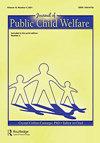Sexual identity development and sexual well-being: differences between racial/ethnic minority and non-racial/ethnic minority former foster youth
IF 1.2
4区 社会学
Q3 SOCIAL WORK
引用次数: 0
Abstract
ABSTRACT Little research has examined if there are differences in sexual well-being, negative sexual health outcomes, or levels of sexual identity development between racial/ethnic minority and non-racial/ethnic minority youth in the foster care system. Using a sample of youth formerly in the foster care system (n = 219), this study compared the sexual well-being, sexual identity development, and negative sexual health outcomes of racial/ethnic minority and non-racial/ethnic minority youth and found that racial/ethnic minority and non-racial/ethnic minority youth did not differ in overall levels of sexual well-being and had no significant differences in their levels of sexual identity development. There were differences in incidence of the youth or a partner having an STI/STD. These results indicate that there are few differences in sexual well-being, negative sexual health outcomes, or sexual identity development between racial/ethnic minority and non-racial/ethnic minority youth formerly in the foster care system. All four domains of sexual identity development predicted sexual well-being for non-racial/ethnic minority youth, but sexual orientation identity uncertainty did not predict sexual well-being for racial/ethnic minority youth, emphasizing the importance of sexual identity development. Attention to the sexual development and sexual health of youth in the foster care system continues to be lacking and should be expanded.性认同发展和性幸福:种族/少数民族和非种族/少数族裔前寄养青年之间的差异
摘要:很少有研究调查寄养系统中种族/少数民族和非种族/少数民族青少年在性幸福感、负面性健康结果或性认同发展水平方面是否存在差异。本研究以219名寄养青年为样本,比较了少数民族和非少数民族青年的性幸福感、性认同发展和负面性健康结果,发现少数民族和非少数民族青年的性认同发展水平和总体性幸福感水平无显著差异。青少年或伴侣感染性病的发生率存在差异。这些结果表明,在性幸福感、负面性健康结果或性认同发展方面,少数民族和非少数民族青少年在寄养系统中几乎没有差异。性认同发展的四个领域都能预测非种族/少数民族青少年的性幸福,但性取向认同不确定性不能预测种族/少数民族青少年的性幸福,强调了性认同发展的重要性。对寄养系统中青少年的性发展和性健康的关注仍然不足,应予以扩大。
本文章由计算机程序翻译,如有差异,请以英文原文为准。
求助全文
约1分钟内获得全文
求助全文
来源期刊

Journal of Public Child Welfare
SOCIAL WORK-
CiteScore
3.10
自引率
12.50%
发文量
38
期刊介绍:
Decisions made in the practice of child welfare have lifelong effects on children and their entire families which in turn affects every facet of society. To effectively practice in this vital field, social workers, psychologists, counselors, juvenile court judges, attorneys, and other child welfare professionals need to stay informed about the latest findings and important issues in public child welfare. To answer this crucial need, the Journal of Public Child Welfare provides a broad forum for theory-based and applied research in child welfare. Rather than limit itself to primarily private agencies, this essential journal provides the quality research and comprehensive information that child welfare professionals and public agencies need most.
 求助内容:
求助内容: 应助结果提醒方式:
应助结果提醒方式:


